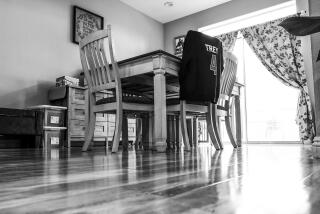iPhone app used to help revive youth basketball player
- Share via
Xavier Jones ran across the middle of the basketball court, ready to receive a pass from a La Verne Lutheran High School teammate. He first stumbled, then stopped, and finally keeled over motionless on the hardwood.
His heart had stopped beating.
After Jones crashed to the floor, head coach Eric Cooper Sr. and assistant coach John Osorno sprinted to his side and administered CPR to the 17-year-old high school senior.
The quick-thinking coaches — with the help of an iPhone — were able to revive him and probably saved his life.
The night before, Cooper had fortuitously downloaded an application to his cellphone that gives real-time instructions on how to administer cardiopulmonary resuscitation.
Jones remembers nothing of his collapse last week, but when he awoke from a medically induced coma 24 hours later, family and friends explained that he suffered from cardiac arrest.
“I’m just thankful and happy to be here,” Jones said in a telephone interview from his hospital bed. “Things could have been a lot worse.”
Cooper had purchased the $1.99 application, called PhoneAid, as a sort of refresher course on CPR.
“It was really fresh and clear in my brain,” he said. “We are trained in CPR, but the iPhone app was a stabilizer for us.”
Linda Jones, Xavier’s mother, said that when she first saw the coach after the Nov. 22 incident, she broke into tears: “I can’t thank him enough for being there for my son.”
Jones is the starting center on the La Verne Lutheran team that won a state championship last year and is ranked seventh in the Los Angeles Times’ high school boys basketball rankings.
Jones, whose teammates call him “X,” is a coach’s dream, Cooper said.
He described him as a kind, yet tough leader, with aspirations far beyond the basketball court.
Instead of listening to music or dozing off in the back of the van on road trips, he sits in the front seat with a book seemingly attached to his hand.
“He’s the guy you want your daughter to marry,” Cooper said.
Jones said he has wanted to become a doctor since he was 5 years old and was planning to accept a scholarship offer to play basketball at West Point, the U.S. Military Academy in New York.
Jones, who has a 4.0 grade point average, said he was interested in West Point because it will pay for tuition through the completion of a doctorate. He plans to enlist and serve as a military doctor.
“I’d ask him, ‘Are you going to be an NBA player?’ and he would say, ‘No, I’m going to be a doctor,’ ” Cooper said. “The decision was going to be based on his career, not just basketball.”
At 6 feet 8 and 220 pounds, Jones is a defense-minded player, but also has a soft jump hook and a bit of a mean streak, Cooper said.
“He’s a nice kid and mild-mannered off the court,” Cooper said. “But on the court, he’s our enforcer.”
Doctors have diagnosed Jones with hypertrophic cardiomyopathy, a condition in which the heart muscle becomes hardened, making it more difficult for it to pump blood. They have told him that his basketball days are numbered and he needs a defibrillator implanted in his chest.
Though his basketball career may not turn out as expected, Jones said he is undeterred in achieving his other goals.
“I’m just happy to be alive,” he said.
More to Read
Get our high school sports newsletter
Prep Rally is devoted to the SoCal high school sports experience, bringing you scores, stories and a behind-the-scenes look at what makes prep sports so popular.
You may occasionally receive promotional content from the Los Angeles Times.







